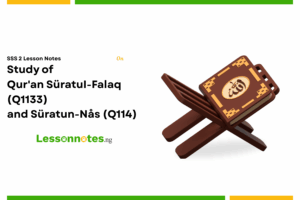Contribution of Selected Muslim Sages to the World Civilization SS2 Islamic Studies Lesson Note
Download Lesson NoteTopic: Contribution of Selected Muslim Sages to the World Civilization
The Islamic Golden Age was a time when Muslims made great discoveries in science, medicine, mathematics, literature, and philosophy. During this time, many Muslim scholars, also called sages, helped build the foundation of modern knowledge. Their work changed how people think and live, not just in the Muslim world but across the entire globe. This lesson will focus on two important Muslim sages: Ibn Rushd and Ibn Khaldun. These scholars made lasting contributions that still influence our world today.
Ibn Rushd (1126-1198 CE)
Who Was Ibn Rushd?
Ibn Rushd, also known in the West as Averroes, was born in Cordoba, Spain (then called Al-Andalus) in 1126 CE. He came from a family of judges and received excellent education in many subjects including law, medicine, mathematics, astronomy, and philosophy. Ibn Rushd worked as a judge, a doctor, and a court advisor to the rulers of his time. He was one of the greatest thinkers of the medieval Islamic world.
Ibn Rushd’s Major Contributions
- Preserving and Explaining Greek Philosophy
One of Ibn Rushd’s greatest contributions was preserving the works of the ancient Greek philosopher Aristotle. During this time, many of Aristotle’s original works were lost in Europe. Ibn Rushd wrote detailed commentaries (explanations) on Aristotle’s books, helping to save this knowledge for future generations. His commentaries were later translated into Latin and Hebrew, allowing Europeans to rediscover Aristotle’s ideas. This helped spark the European Renaissance, a time of great learning and art in Europe.
- Harmony Between Religion and Reason
Ibn Rushd believed that religion and rational thinking could work together without conflict. He wrote that:
– The Quran encourages people to use their minds and think deeply
– Scientific truth and religious truth could not contradict each other
– If they seemed to conflict, it was because people misunderstood one or the other
– Different people could understand religious texts at different levels based on their education
This idea that faith and reason could coexist influenced later thinkers in Islam, Christianity, and Judaism.
- Advances in Medicine
Ibn Rushd wrote an important medical book called “Kitab al-Kulliyat” (The Book of Generalities), known in Latin as “Colliget.” This book covered:
– Human anatomy (the study of body parts)
– The causes of diseases
– The diagnosis of illnesses
– Different treatments and medicines
– The importance of prevention
He also discovered that no one could get smallpox twice, showing early understanding of immunity.
- Contributions to Law and Ethics
As a judge, Ibn Rushd wrote important works on Islamic law that helped develop legal thinking. He believed in:
– Using reason to understand and apply religious laws
– Treating people fairly regardless of their social status
– Looking at the purpose behind laws, not just following them blindly
Ibn Rushd’s Influence on World Civilization
Ibn Rushd’s ideas traveled beyond the Islamic world and deeply influenced European thought. His works were studied in European universities for centuries. The movement called “Averroism” (named after him) spread throughout Europe. Many scholars consider him a bridge between Islamic and Western thought. His defense of reason helped lay the groundwork for the scientific method that developed later.
Ibn Khaldun (1332-1406 CE)
Who Was Ibn Khaldun?
Ibn Khaldun was born in Tunis (in modern-day Tunisia) in 1332 CE. He lived during a difficult time when many Muslim states were facing political problems. Unlike Ibn Rushd who stayed mostly in Spain, Ibn Khaldun traveled widely throughout North Africa and the Middle East. He worked as a scholar, advisor to rulers, teacher, and judge. His life experiences in different societies gave him unique insights into how civilizations work.
Ibn Khaldun’s Major Contributions
- Founding Modern Social Sciences
Ibn Khaldun’s greatest achievement was creating what many consider the first social science. In his masterpiece, “The Muqaddimah” (The Introduction), he developed:
– A scientific method for studying human society
– Theories about how civilizations rise and fall
– Ways to verify historical information
– Understanding of economic principles
Many modern scholars consider him the father of sociology (the study of society), historiography (the study of historical writing), economics, and demography (the study of populations).
- New Approach to History
Before Ibn Khaldun, most history books simply recorded events without explaining why they happened. Ibn Khaldun changed this by:
– Looking for patterns and causes in history
– Analyzing the social, economic, and environmental factors that influence events
– Questioning unreliable sources and checking facts
– Understanding that societies change over time according to discoverable laws
His approach to history was revolutionary and similar to how modern historians work today.
- Economic Theories
Ibn Khaldun developed economic ideas that were far ahead of his time:
– He understood the importance of labor (work) in creating wealth
– He explained the concepts of supply and demand and how they affect prices
– He recognized the economic benefits of division of labor (when people specialize in different jobs)
– He analyzed how government spending and taxation affect the economy
Many of these ideas would not be “discovered” in Europe until centuries later by economists like Adam Smith.
- Understanding of Group Feeling (‘Asabiyyah)
Ibn Khaldun introduced the concept of ‘Asabiyyah (group feeling or social cohesion), which explains:
– How strong bonds between people help societies succeed
– Why dynasties and civilizations rise and fall in cycles
– How rural groups with strong social bonds often conquer urban civilizations
– Why societies tend to decline after several generations of success
This theory helped explain the pattern of history in a new way.
Ibn Khaldun’s Influence on World Civilization
Ibn Khaldun’s ideas were rediscovered by Western scholars in the 19th century. Today, his work is studied in universities around the world in departments of history, sociology, economics, and political science. His scientific approach to understanding society laid the groundwork for modern social sciences. Many scholars consider “The Muqaddimah” one of the most important books ever written about human civilization.
Comparing Ibn Rushd and Ibn Khaldun
While both scholars made enormous contributions, they focused on different areas:
– Ibn Rushd excelled in philosophy, medicine, and reconciling faith with reason
– Ibn Khaldun pioneered the social sciences and the scientific study of history
– Ibn Rushd built upon Greek knowledge, while Ibn Khaldun created more original theories
– Ibn Rushd had immediate impact on European thought, while Ibn Khaldun’s greatest influence came centuries later
The Lasting Impact of These Muslim Sages
These two great Muslim thinkers helped shape the modern world in many ways:
- They preserved and expanded ancient knowledge
- They showed that faith and scientific thinking can work together
- They developed new methods for understanding the world
- They built bridges between different cultures and civilizations
- They demonstrated the importance of reason, evidence, and critical thinking
Their legacy reminds us that the modern world was built by contributions from many different civilizations working together across time and space.
Ibn Rushd and Ibn Khaldun represent the heights of intellectual achievement during the Islamic Golden Age. Their works not only enriched Islamic civilization but also contributed greatly to world knowledge. By studying these Muslim sages, we gain a better understanding of how human knowledge develops across cultures and generations. Their examples show how thinkers from different backgrounds have helped build our modern understanding of the world.






















